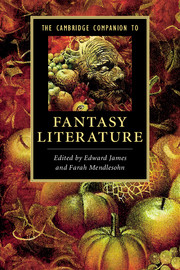Book contents
21 - Fantasies of history and religion
from PART III - CLUSTERS
Published online by Cambridge University Press: 28 March 2012
Summary
In his short story ‘Novelty’ (1983), John Crowley explores a counterfactual about religion and history. A writer who may be a self-portrait of Crowley sits in a New York bar and ponders the subject of his next work. He imagines an alternate story of Christianity, where Christ refused to take up his cross and instead lived on – making, in a sense, a fuller commitment to humanity that way. In doing so, he imagines another kind of religion from Christianity: at another point in the story, his editor mistakes this for pantheism. The writer responds:
‘No. No. The opposite. In that kind of religion the trees and the sky and the weather stand for God or some kind of supernatural unity. In my religion, God and all the rituals and sacraments would stand for the real world. The religion would be a means of perceiving the real world in a sacramental way. A Gnostic ascension. A secret at the heart of it. And the secret is – everything. Common reality. The day outside the church window.’
A religion of this kind – created from what we might call an aesthetic and moral critique of Christianity as it is – could perhaps never exist in the real world, or even in a sustained work of fiction. The work Crowley embarked on following ‘Novelty’, the four-book Ægypt sequence, is in part an embodiment of this idea of making the everyday sacramental, but Ægypt takes on so many other ideas that it is hard to see it as the sole motivation for the series. However, there are other works that have the same relationship to religion as that described in Crowley's story above.
- Type
- Chapter
- Information
- The Cambridge Companion to Fantasy Literature , pp. 248 - 256Publisher: Cambridge University PressPrint publication year: 2012
- 1
- Cited by



